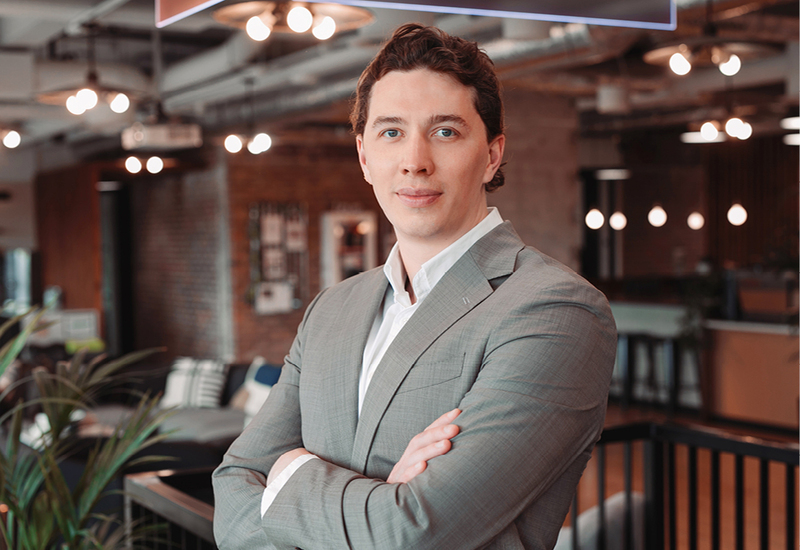
Vadim Limar is CEO of Bringo Net, a company that develops and implements telecommunication technologies. A graduate of the world's top universities in management and finance, he has worked with the United Nations and managed a wide range of business projects. What competencies does a manager need? Why has the ability to communicate become the most valuable skill in today's world? How has the IT market changed? Which country has the best investment climate for startups? In an interview with Kommersant UK, Vadim spoke about how his path in life and business was shaping up.
Tell us about your background. What kind of education do you have?
I had a varied education. I studied in Kazakhstan and graduated from the Zhaniya Aubakirova School for Talented Children, with an in-depth study of music (I play the saxophone). During my time there, I was class president and captain of the basketball team. While on exchange to a boarding school in Sussex, UK, I smashed a local record by becoming a prefect in the shortest time ever. My next stop was the world’s oldest and most renowned hotel management school, Ecole hôtelière de Lausanne (Kommersant UK has written about it here), also becoming a class president and sports ambassador there.
After my first work placement in a hotel, it became clear to me in my second year that finance held a bigger appeal, so my next placement was in the Geneva office of KPMG.
Our team has conducted audits for UN international charities and foundations such as UNICEF and UNFPA, to name but a few. We checked how third-party organisations spend UN humanitarian aid funds. After two months of work, we were mandated to monitor and conduct 145 audits in ten countries around the world, including flash points in conflict zones such as Afghanistan, Syria and Iraq, and in emergency zones in Africa. We completed almost all of the audits, but a few had to be cut short due to the risk to employees' lives from war or terrorist threats. The company’s management commended me for this project.
Having gained a Leadership Scholarship, I embarked on an MBA from ESADE Business School, continuing to hone my leadership and organisational skills by being a class president, and reaching a high proficiency standard (getting into the top 1% of students based on final grades). This allowed me to make the cut for an exchange programme to study at the Haas School of Business at the University of California, Berkeley (USA).
So what led me to these institutions? They are ranked in the top twenty globally and are the best in training entrepreneurs and startup founders. Top speakers and entrepreneurs with practical experience who have reached incredible heights in the venture capital and investment business teach there. Apart from the core subjects, I studied Venture Capital, Entrepreneurship and Communications (sharpening my skills in elocution, self-presentation and public speaking).
I believe that the ability to communicate is one of the most valuable skills of our time, equally important in business and daily life. In order to supercharge it, I went to acting school, learning how to speak in front of large audiences, present myself and interact with people from all walks of life, and even managed to star in a few commercials and short films.
What qualities and competencies have helped you become an effective manager?
I'll start with personal qualities. Having left home at the age of fifteen, I have since managed to live in over ten countries, trying several cities within the same country. This taught me to adapt swiftly to whatever life throws at me. My ability to adapt makes me feel comfortable in today's world full of uncertainty and rapid change.
The second important quality is optimism. Optimistic people see the world differently and perceive problems differently, often finding unusual “out of the box” solutions. They energise those around them with their positive energy, which is an essential skill for a leader. I have not always been an optimist but will keep cultivating this quality in myself.
The third quality is self-motivation and curiosity, because in every situation, both in daily life and at work, we need not only to motivate ourselves but also to boost the confidence of others. Motivation and curiosity can’t really be faked. If a leader is not interested in a project, it shows after just a couple of months. The performance of the leader and their team drops, efficiency slumps and results worsen.
In terms of competencies, one of the main ones, in my opinion, is the ability to analyse and work with information. Now there are many solutions that help with this, but seeing the statistics is not enough: you need to be able to interpret them, find correlations and choose the best solutions.
The second competency is the ability to communicate, and I am constantly honing it. This skill is indispensable in the workplace: the ability to articulate, express and accentuate your thoughts clearly helps when communicating with stakeholders and clients, as well as with founders and investors. Of course a person can’t know everything, but the ability to communicate will help them improve their competence in many areas of activity, through interaction with different people and asking the right questions.
The third competency is human resource management. Nowadays people spend most of their time at work, and for many their team virtually becomes their family; the manager's task is to get off on the right foot so that people feel supported, motivated and strive towards the same goal.
What are your most significant achievements in the technology sector?
When I worked at Amazon's Warehouse department, which deals with high-quality used or pre-opened goods (with a turnover exceeding €1 billion), I came up with a tech solution that generated €60 million in additional annual revenue for the company, and that's just in two categories: Electronics and Computers & Accessories. After a number of studies and product structuring, I approached the task as a financier and proposed to emphasise the criteria for valuing such products. We categorised the items, matching them with different sites around the world selling similar items, and introduced new volatility metrics vis-a-vis other marketplaces, which ultimately gave us the ability to measure how much cheaper or more expensive items were selling on Amazon compared to its competitors, and adjust the pricing accordingly.
You are an expert in tech business management. What key transformations in the IT technology and digital project market would you highlight over the last few years?
Artificial intelligence and machine learning: this has certainly become a key trend, and now these technologies are used not only in science, but also in business and everyday life, one example being ChatGPT. No-code and low-code visual programming services: with their help, almost anyone with basic technical skills can develop and create a website, an app or other products using ready-made templates and elements, without programming or working with code (but retaining the possibility to do so). Cloud migration: the process of moving data and applications from on-premises data centres to cloud infrastructure or from one cloud environment to another. Cloud migration reduces infrastructure costs, makes it easier to access large amounts of data from anywhere in the world, makes it easier for businesses to scale, and when used correctly, is the most secure way to store information.
What are the most promising areas in the IT industry in terms of investment?
Fintech, as well as education (financial literacy apps for children and teenagers are popular) and health. I would also highlight biomedicine, but the main investors in this area are major venture capital funds, because it is very long-term and big money (it’s needed for research, organising production, creating prototypes and testing them).

Which countries offer the most favourable conditions for IT startups and investors, both in terms of private capital and state economic policy?
If we talk about the UK, there are various government programmes that support investment in startups, including in early-stage risky ones. The most popular programmes are SEIS and EIS. They offer investors tax relief on their investments, but these programmes are only meant for startup companies registered in the UK. Also, investors are exempt from capital gains tax if they hold on to the shares for more than three years. Private investors in Britain are more cautious and are reluctant to invest in startups.
Singapore has an interesting scheme: an investor invests in a startup and applies for co-financing from the state, which can allocate funds if it likes the business idea. There are no fixed amounts of state support, and in each case the amount of investment is determined individually. Also, investors receive 50% of the state's earnings from these investments.
The US certainly boasts the most comfortable environment for startups: it has a developed ecosystem with an established infrastructure, including various incubators and accelerators operating across the country, and numerous programmes offer tax and other incentives. But what matters most is the mindset: the people there are not afraid to take risks and are ready to invest both in startups and venture funds. I speak from personal experience: last year Bringo Net joined an accelerator in Tampa Bay, and being part of it has opened up great opportunities for the company. We moved to New York and may be looking to get funded in the US in the future.
You head Bringo Net. What tech solutions is your company working on? Where is its head office? Do you plan to scale up the business and enter new markets?
Bringo Net was originally an internal development of Bringo Group Ltd., an international technology company that designs, develops and supports unique digital solutions in various industries. When it became clear that the product had huge potential, would have functionality and work globally, the decision was made to set up a separate company with its head office in New York, opening in May 2023. Our company has created a telecommunications solution complementing the capabilities of fibre optics. We use skywave technology, a way of broadcasting radio waves (mainly in the shortwave spectrum) by reflection and refraction in the ionosphere (the upper electrically charged layers of the atmosphere). This allows us to receive transmissions from over the horizon without direct visibility. Here's an example: a fibre optic cable has been laid from Chicago to London. Its route is not ideal and passes through various obstacles (mountains, the ocean floor, etc). Our solution boils down to installing two antennas, one in Chicago and one in London, and linking them directly. By doing this, for every thousand kilometres of fibre we circumvent, we gain 1 millisecond (a thousandth of a second), which means that on average our communication will be 50% faster. And if the distance between two megacities is more than 6,000 kilometres, the latency will decrease by about 6 milliseconds. Such an advantage may seem like a minor stretch to a lay person, but we specialise in connections between the world's largest stock exchanges. Our customers are high-frequency traders who are fighting for every nano- and picosecond.
As for the company's development and further scaling up: the first area we are currently working on is connecting the main global financial hubs in Chicago and London. Market growth and traffic volume permitting, in the next stage we are looking at expanding to Mumbai, New York, Tokyo, Hong Kong, Sao Paulo, etc.
What essential reading would you recommend to aspiring entrepreneurs?
I love books that are applicable to real life, which offer clear examples and provide practical knowledge. That being said, it is even more useful reading them in a specific order. Start with Blue Ocean Strategy (2005) by Chan Kim and Renée Mauborgne. It tells you how to find a niche, start your own business and create value for your future customers. ‘Blue Ocean’ counterbalances the ‘Red Ocean’ where everyone is fighting for margins, customers and new solutions. The book will be of interest to those searching for their business idea.
Move on to The Lean Startup: How Today's Entrepreneurs Use Continuous Innovation to Create Radically Successful Businesses, by Eric Reis (2011). The book clearly sets out how to create the best possible product for customers with the least financial outlay. ‘Lean Startup’ is a methodology for building a business or launching your own startup, the essence of which is constant product testing. First the product is released in small batches, then feedback from consumers is collected and the product is refined. This approach is called ‘lean startup’, since it aims to understand customer preferences at the product development stage, and to release a final product that exactly matches the market demands.
One of my all-time favourite books (since I love communications, presentations and negotiating) is Never Split the Difference: Negotiating As If Your Life Depended On It, by Chris Voss (2016), who is a former top FBI negotiator. It wasn’t money that was at stake in his work, but human lives. In the book, Chris shares his practical experience on how to talk to people and how to formulate and ask questions to get the answers you need. I use his methods both in business and in my daily life.






